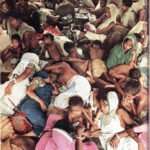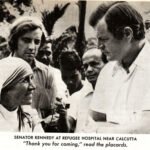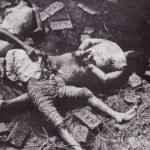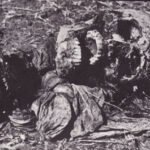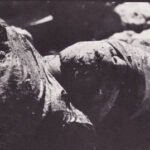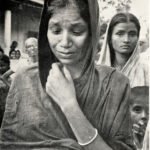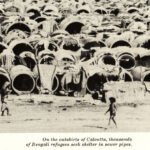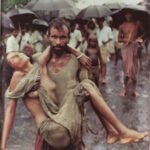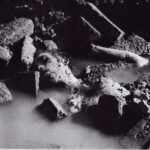➡ 1915: 800,000 Armenians.
➡ 1933-45: 6 million Jews.
➡ 1971: 3 million Bangladeshis.
➡ 1972-75: 100,000 Hutu.
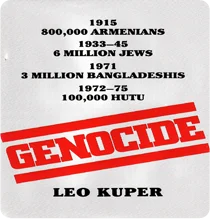
➡ The human tragedy that occurred in a small hamlet known as My Lai in South Vietnam is now being repeated in a whole country and upon a whole nation.
➡ A thousand My Lais are being perpetrated in Bangladesh every day, by the marauding trigger-happy gunmen from West Pakistan.
➡ “When we moved around (Kushtia), everyone fled. It was like the morning after a nuclear attack. The people were terrified and still shocked and dazed.”
➡ They surrounded our villages on three sides and set fire to it. When we ran out they fired with machine guns and killed many.
➡ A thousand My Lais are being perpetrated in Bangladesh every day, by the marauding trigger-happy gunmen from West Pakistan.
➡ Like thousands of other people in East Bengal, he had made the mistake the fatal mistake-of running within sight of a Pakistani army patrol. He was 24 years old, a slight man surrounded by soldiers. He was trembling, because he was about to be shot.
➡ "Why kill him?" I asked with mounting concern.
➡ "Because he might be a Hindu or he might be a rebel, perhaps a student or an Awami Leaguer.
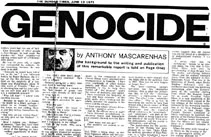
➡ India is particularly incensed over the present U.S. policy, and Prime Minister Indira Gandhi strongly protested to Henry Kissinger about U.S. military shipments when he visited New Delhi this month
➡ The supply of arms by any country to Pakistan, Foreign Minister Swaran Singh charged last week, "amounts to condonation of genocide."
➡ India is feeding the refugees that amounts to more than $1,000,000 a day.
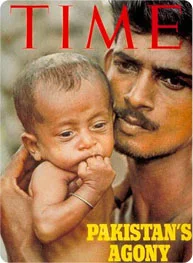
➡ During the campaign of terror in Bangladesh, the erstwhile East Pakistan, thousands of women are raped by West Pakistani soldiers. Now many victims have been shunned by their husbands and families.
➡ There were six soldiers in all. Two went into the room that had been built for the bridal couple. The others stayed behind with the family, one of them covering them with his gun.
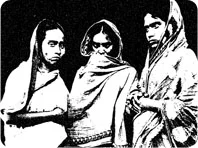
➡ Assembling young men of the village of Haluaghat in East Pakistan, a a Pakistani Army major informed them that his wounded soldiers urgently needed blood.
➡ The young men lay down on makeshift cots, needles were inserted in their veins - and then slowly the blood was drained from their bodies until they died.
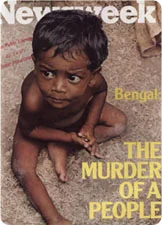
➡ Tanks and soldiers with submachine guns and grenades seized Dacca (Dhaka) University early in the morning on March 26.
➡ All students residing in Iqbal Hall, the dormitory center, were put to death.
➡ The building was gutted by shells from tanks.
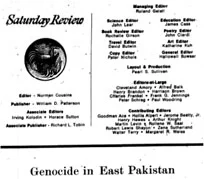
➡ In that letter, Dr. Rohde gives an eye witness account of the terror and killing by the West Pakistan Army upon the unarmed, civil population of the city of Dacca in East Bengal.
➡ The chief targets were the university, the populous Old City where Sheikh Mujibur Rahman and his Awami LEague were strongest, and the industrial areas on the outskirts of the city of 1.5 million.
➡ They saw mass graves in which dead students were heaped together outside the halls where they had studied.

➡ “ HERE IN DACCA WE ARE MUTE AND HORRIFIED WITNESSES TO A REIGN OF TERROR BY THE PAK MILITARY. EVIDENCE CONTINUES TO MOUNT THAT THE MLA AUTHORITIES HAVE A LIST OF AWAMI LEAGUE SUPPORTERS WHOM THEY ARE SYSTEMATICALLY ELIMINATING BY SEEKING THEM OUT IN THEIR HOMES AND SHOOTING THEM DOWN.”
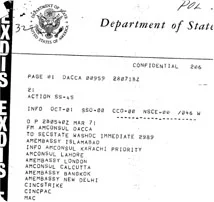

March 7 Speech
The struggle this time is the struggle for our Liberation. The struggle this time is the struggle for our Independence.

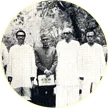

Casualties
The mass killings, rapes, and mutilations are one of the worst in human history.
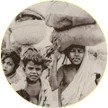
Refugees
10 Million Bangladeshi Refugees – one of the largest single displacement in human history.
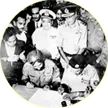
About CBGR

The CENTER FOR BANGLADESH GENOCIDE RESEARCH (CBGR) is an American institution for the documentation
, study, and interpretation of the history of 1971 genocide, and serves as Bangladesh’s memorial to the millions of people murdered during the 1971.
The genocide was the state-sponsored systematic persecution and annihilation of Bengalis by Pakistani occupation army and its collaborators between March 26 and December 16, 1971. Bengalis were the primary victims. Three million were murdered and ten million were refugees. More than 400,000 women were raped. Political dissidents also suffered grievous oppression and death under the rule by the occupation army.
The Center’s primary mission is to advance and disseminate knowledge about this unprecedented tragedy; to preserve the memory of those who suffered; and to encourage its people to reflect upon the moral and spiritual questions raised by the events of the crimes against Humanity as well as their own responsibilities as citizens of a democracy.
The Center strives to broaden public understanding of the history of the genocide through multifaceted programs: exhibitions; research and publication; collecting and preserving material evidences, art and artifacts related to the crimes against humanity as Days of Remembrance; distribution of education materials and a variety of public programming designed to enhance understanding of the genocide and related issues, including those of contemporary significance.
Please contact CBGR at 1@cbgr1971.org.
